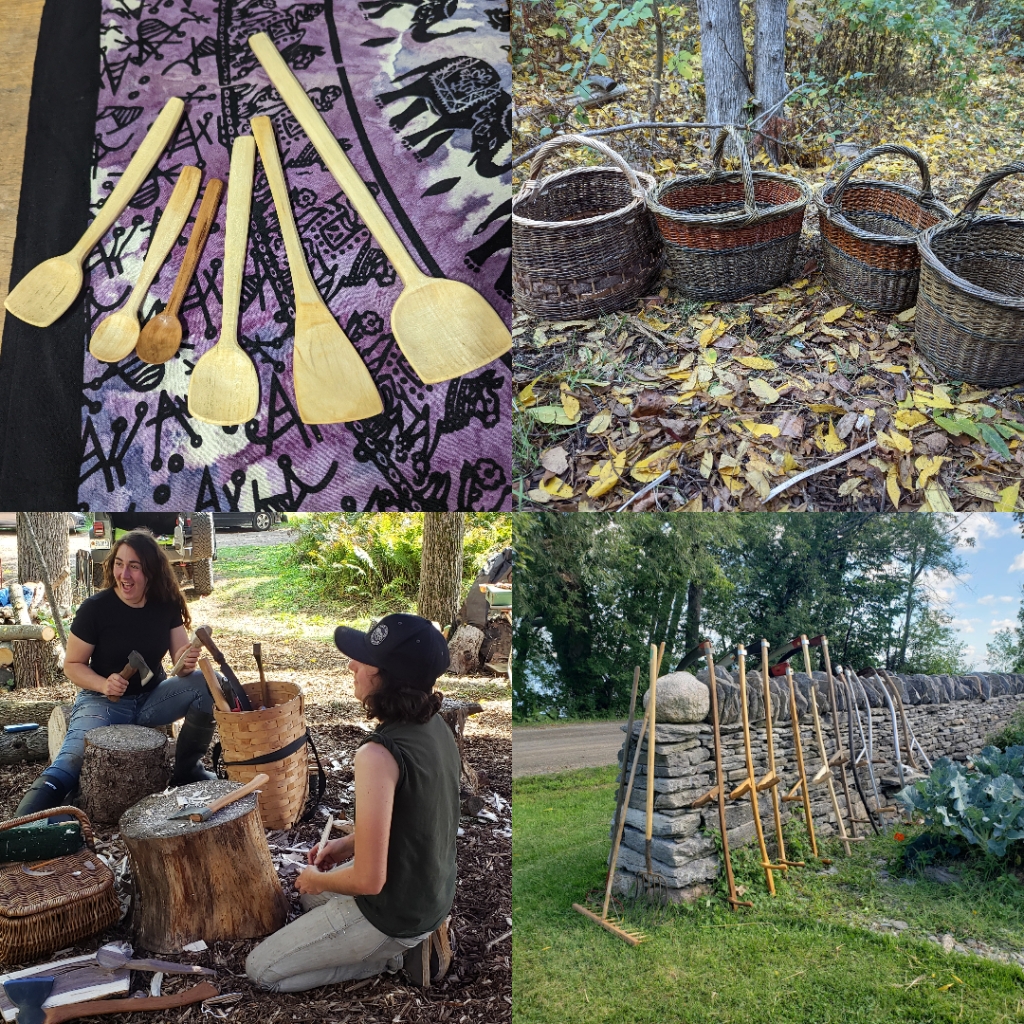
This Spring, a new project is starting at the University of Waterloo which will offer students, faculty and staff opportunities to connect with land-based skills and crafts. The project is a collaboration between the Ontario Land Skills Network and the University of Waterloo and is based on research linking craft and skills practice, connection to nature and to communities of care to personal wellness and sustainability outcomes.
Mental Health and Sustainability
The World Health Organisation reports that mental health disorders are the leading cause of years lived with disability, affecting 1 in 8 people world wide.1 In Canada, mental health disorders affect 65 million people and one in two people will have had a mental illness before the age of 40 issues2. The crises seems particularly acute in young people, with emergency visits related to mental health concerns for Canadians aged five to 24 increasing by 75 per cent between 2007-2017. Widely referenced reports imply the state of student mental health is declining, with depression and anxiety 6-7 times higher than non-students3 Key issues are the vulnerability of students seeking out care, and the problems and limitations with institutions’ responses. However, University culture itself may also be a cause for concern with toxic positivity, hustle culture and even a focus on individual wellness contributing to the pressure students feel4 The academic environment, is increasingly virtual and can be isolating and competitive, trends which have increased since the COVID pandemic. The Academy itself focusses on a particu There is also an economic cost associated with existing medical approaches for treating mental health which requires continued growth, which may not be compatible with some pathways to sustainability.
The World Health Organisation states that mental health is a basic human right which is crucial to personal, community and socio-economic development, so it is intimately interlinked with sustainability. 5 Mental Health is central to Sustainable Development Goal #3 Healthy lives and well-being but is also connected to many other goals including SDG#1 Poverty and SDG#10 Inequalities 6
Connection to Nature
Connection to the natural world and to supportive communities is a requirement for both sustainability and wellbeing2;
This project builds on the evidence that both mental health and attitudes to sustainability can be improved by connection to nature and nature-based activities, particularly making from natural materials; building connections to land, place and community; and engagement in “flow” activities where opportunities for material consumption are replaced by mindful experiences.
Disconnection to Nature is increasingly recognized as contributing to the mental health crisis. In “Last Child in the Woods” Richard Louv identifies Nature Deficit Disorder and recounts how direct exposure to nature is key for the physical and emotional health. Additionally, working in and with nature and natural materials promotes wellness. In an article summarizing research on crafts and skills, the UK Crafts Council presented evidence that these somatic experiences can alleviate the symptoms of anxiety, depression, loneliness and even dementia.
Students are hyper-mobile individuals, often with career trajectories beyond campus who often may struggle to achieve a connection to, or sense of, community and of “place”, factors which are also linked to wellness. Author and educator Joanna Macy reminds us that discovering and experiencing “connections with each other and the self-healing powers of the web of life [transforms] despair and overwhelm into inspired, collaborative action,”
This project emphasizes experiential learning where students, staff and faculty engage in direct experience of land skills nature and engagement through a series of workshops: green woodworking, basket weaving, scything, nature weaving, herbal tea making and nature walks. Following this they engage in reflection to increase knowledge, develop skills, clarify values, and develop capacity to contribute to their communities. These are activities of ‘making’ based on the land or using locally-sourced natural materials and in many cases with a purposeful outcome.
Crafts and skills are often cornerstones of cultural expression, and through “Crafts Across Cultures” this project explores and supports the cultural richness of the Waterloo campus by facilitating culturally specific programming in dialogue with participating communities.
This pilot project’s primary aim is to advance environmental sustainability through knowledge mobilization about the power of new experiences of engagement with nature, to build new individual and collective stories of stewardship and collaboration, supporting the emergence of a new culture of sustainability. Knowledge here is embodied in experiential activities that engage and connect students, staff, and faculty to each other as a community-in-place connecting to the natural world through physical acts of making. Connecting to place and to community is identified as an important element in the willingness to steward ecosystems and engage in participatory action to solve sustainability issues.
Footnotes
- World Health Organization (WHO). (2022). World Mental Health Report: Transforming Mental Health for All. Executive Summary. https://doi.org/10.1136/bmj.o1593
- CAMH. (n.d.). The Crisis Is Real. Accessed 02/05/2023 https://www.camh.ca/en/driving-change/the-crisis-is-real
- E, M. C., Wiens, K., Bhattarai, A., Dores, A., Pedram, P., Williams, J. V. A., Bulloch, A. G. M., & Patten, S. B. (2020). Mental Health among Canadian Postsecondary Students : A Mental Health Crisis ? https://doi.org/10.1177/0706743719874178
- Parsons, J. (2023). University culture and the student mental health crisis Systemic factors need to be acknowledged and addressed. Waterloo News. https://uwaterloo.ca/news/university-culture-and-student-mental-health-crisis
- World Health Organsiation. (2022). Mental Health: Strengthening Our Response. https://www.who.int/news-room/fact-sheets/detail/mental-health-strengthening-our-response
- Goodwin, J., & Zaman, U. (n.d.). Editorial : Mental health stigma and UN Sustainable Development Goals. https://doi.org/10.1186/s12888-021-03435-4